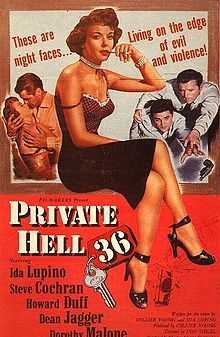Private Hell 36
| Private Hell 36 | |
|---|---|
 Theatrical release poster | |
| Directed by | Don Siegel |
| Produced by | Collier Young |
| Screenplay by |
Collier Young Ida Lupino |
| Starring |
Ida Lupino Steve Cochran Howard Duff |
| Music by | Leith Stevens |
| Cinematography | Burnett Guffey |
| Editing by | Stanford Tischler |
| Studio | The Filmakers |
| Distributed by | Filmakers Releasing Organization |
| Release dates |
|
| Running time | 81 minutes |
| Country | United States |
| Language | English |
Private Hell 36 is a 1954 black-and-white film noir, directed by Don Siegel. It features Ida Lupino, Steve Cochran, Howard Duff, among others.[1]
The picture was one of the last feature-length efforts by Filmakers, a company created by producer Collier Young and his star and then-wife Ida Lupino.
Plot
L.A. police detectives Cal Bruner (Steve Cochran) and Jack Farnham (Howard Duff) get in over their heads when they decide to split up thousands of dollars they found on a recently killed counterfeiter. To make matters worse, they are assigned by their police captain to look for the missing cash.
Things get even worse when one cop gets romantically involved with Lili Marlowe (Ida Lupino), a money-hungry nightclub singer. Farnham decides to turn honest and hand the money over to his superiors, but the other cop decides to take it all.
Cast
- Ida Lupino as Lilli Marlowe
- Steve Cochran as Cal Bruner
- Howard Duff as Jack Farnham
- Dean Jagger as Capt. Michaels
- Dorothy Malone as Francey Farnham
- Bridget Duff as Bridget Farnham
- Jerry Hausner as Hausner, Nightclub Owner
- Dabbs Greer as Sam Marvin, bartender
- Chris O'Brien as Coroner
- Kenneth Patterson as Detective Lieutenant Lubin (as Ken Patterson)
- George Dockstader as Fugitive
- Jimmy Hawkins as Delivery Boy
Background
The racetrack scenes in the film were shot at Hollywood Park Racetrack in Inglewood, California.
Reception
Critical response
Film critic Bosley Crowther wrote a tepid review, "A critic might note that attention is sharply divided between the main theme and the incidental character that Miss Lupino plays. This is somewhat understandable, since Miss Lupino happens to be one of the partners in Filmakers and a coauthor of the script. But let's not worry about it. No deplorable damage is done. There's not very much here to damage. Just an average melodrama about cops."[2]
Critic Dennis Schwartz wrote "If not a spectacular film, it's at least a tight B-film that has two great action scenes: the opening gun battle during the robbery and the surprising climactic gun battle. It excels more as a character study between the cool, likable, amoral Bruner and the nervous, straight-laced, decent family man Farnham: a study in opposites. Bruner's big mistake is that he feels for the first time and desires Lilli at any cost, who is someone in need of a high-roller to give her diamonds. The rogue cop is a complicated and ambiguous character, who is only doomed when he doesn't know how to handle what he feels eating away at him."[3]
References
- ↑ Private Hell 36 at the American Film Institute Catalog.
- ↑ Crowther, Bosley. The New York Times, film review, "Private Hell 36,' a Story of Policemen, Has Premiere at the Paramount", September 4, 1954. Accessed: June 23, 2013.
- ↑ Schwartz, Dennis. Ozus' World Movie Review, film review, February 9, 2005. Accessed: June 23, 2013.
External links
- Private Hell 36 at the American Film Institute Catalog
- Private Hell 36 at the Internet Movie Database
- Private Hell 36 at allmovie
- Private Hell 36 at the TCM Movie Database
- Private Hell 36 at Film Noir of the Week by Megan Abbott
- Private Hell 36 film trailer at YouTube
| |||||||||||||||||